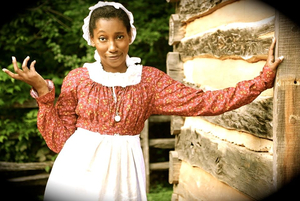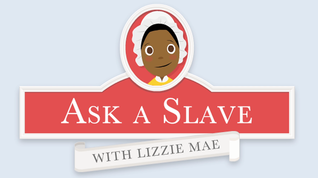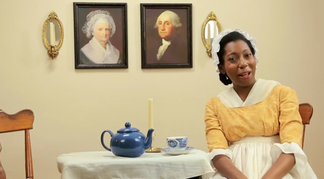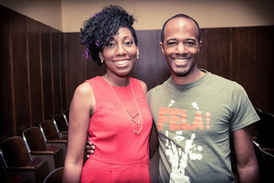|
I've had the extreme pleasure of working with the lovely, sharp and talented Azie Mira Dungey on a number of occasions. The recent attention and immediate success for her new web series Ask a Slave! comes as no surprise. Ask a Slave! is based entirely on the day-to-day encounters she had while working as a slave character at George Washington's Mount Vernon. The character of Lizzie Mae is a made up person, who did not live at Mount Vernon, but is inspired by the women she portrayed. This smart, witty, satirical look at race relations is a welcome and useful addition to current racial and social discourse. Click here to hear her recent interview NPR's Meghna Chakrabarti on Here and Now. Episodes One and Two have already been released. New videos will be released every Sunday. Make sure you don't miss a single one by subscribing here. Four more videos will be released in the series. Please enjoy Episode One: Meet Lizzie Mae. If you enjoyed this episode, please consider making a donation to Ask a Slave! by clicking here. To learn more about Azie Mira Dungey, the process and inspiration for Ask a Slave!, and a behind-the-scenes look at production, please enjoy this interview.  JACQUELINE LAWTON: Why did you decide to get into theater? Was there someone or a particular show that inspired you? AZIE MIRA DUNGEY: That is an easy question. I have always loved television and films. When I was a little girl, I watched The Carol Burnett show every night before bed. I spent most of my time writing stories and acting them out. This is how I entertained myself as an only child who did not attend preschool. What sealed the deal for me, so to speak, was a performance I attended with my mother. It was “Ragtime” at the Kennedy Center. My mother is not a fan of musicals, but I remember looking over to her in middle of Act II and her eyes were filled with tears. And I thought, “I want to do that.” I don’t mean that I wanted to make my mother cry. I wanted to make people connect with a story and find an emotional release--laughter, tears, what have you-- for the greatest purpose: to learn more about themselves, and each other, and grapple with this question of what it means to be human. For me, Ragtime did that. And it’s still my favorite show. JL: How long did you live and work as an actor in the D.C. area? What brought you here? AMD: I moved to Prince George’s County when I was 8 years old. I grew up mostly in College Park. I went to NYU, and soon after graduation, I came back. Honestly it was because I got married, and we decided to make a go of it there. It was a great decision and I enjoyed working in theatre there. I’ve lived in Los Angeles for about 9 months now.  JL: You describe “Ask a Slave” as a new comedy web series hosted by the plucky Lizzie Mae, housemaid to George and Martha Washington. What inspired you to create this provocative, smart and humorous new show? AMD: I worked at Mount Vernon as a part-time day job for about two years. I actually quite enjoyed it, mostly because I loved the people I worked with and I love learning. The subject matter was horrifying, but the working experience was quite pleasant. The impetus for this series came from friends and family. I would tell them the stories of these crazy or disturbing or humorous interactions with visitors, and we would laugh or be incredibly angry together (many times both). They encouraged me to write it down, which I started doing. I had a conversation with the DC-area actress Jennifer Mendenhall while in her kitchen, and she was very insistent that I make a show about it. She was thinking theatre, maybe a one-woman show. As I ruminated over it, it became clear to me that it would work best on film because the questioners could sort of pop in and out, and my character would still be in control. I wanted to talk about these crazy Mount Vernon questions, not just to make fun of them or the experience I had, but also to give kind of a “checking-in” on where we are as a country with this. History is our narrative, it shapes what we think of ourselves and our society. How it is controlled, and whose stories get told (or not told) has a strong effect on culture, and even on public policy. These misconceptions about black history and the modern black experience is really dividing us politically and socially. If we don’t understand racism and where it comes from, how can we end it? How can we weed it out? We have to be critical of these things to make true progress. JL: What is a living history character? How is this different from playing a character from history in a film or play? AMD: I spent about two months in the MV library reading about the time period, and George Washington’s life, and the very specific stories of three enslaved women that I portrayed. That was amazing. I learned so much and I was eager to give that knowledge away. Living history can be very effective, but it is also very strange. The strange part is that you are kind of caught between actor and educator, and you are put in situations that this person you are playing would never have experienced. Caroline Branham, Mrs Washington’s Lady’s maid, would never have been sitting in a Greenhouse sewing shirts and talking to a school group from Ohio that keeps trying to explain to her what a cell phone is. So it can be very frustrating and awkward. I should say that MV actors don’t do living history, exactly. At Williamsburg, you will see living history, because they are living as a town in that time, and you, as a visitor, walk into that world. At Mount Vernon, there were maybe 5 of us, and on any given day, perhaps 1-3 of us working at a time, and we were the only ones “living” in 1797. We were really just there to answer questions. I did not wash clothes, or dye wool or fetch tea for Mrs. Washington. I was a “housemaid” who wasn’t even allowed to be in house because it is a museum! So that is why is was all about the questions.  JL: What do you love about playing Lizze Mae? What is the most challenging part of bringing her to life? AMD: Lizzie Mae is just great. I love playing her. (I mean, I wrote her!) I love that she is candid but thoughtful, and gracious. I think she is very classy, though she is a low-status person. That is something that I believe is a part of the African American female experience: Having to find grace and dignity in yourself and your life in a world that thinks you are less than a man, and even less than a human. That was actually also the most challenging. To tow the line between her own high sense of herself and her inherent oppression. People at MV often asked me if I (my character) was happy. I would say “People like me aren’t given happiness in this life, we have to make it.” I wanted to make sure that came across. She can find laughter and goodness in a moment, but she is living in the pain and horror of slavery. Another issue was making sure that she did not become a minstrel show. I don’t think I have to get into that. We all know what I mean. But she is not the butt of the joke. Her speech patterns, her looks, her situation is not what makes the comedy. It’s the ignorance and misconceptions of others that bring the laughs. That was very important.  Azie Dungee and Jordan Black (Director) Azie Dungee and Jordan Black (Director) JL: What is the process of creating a web series? Who are your collaborators? How long does it take from when you’ve written an episode to when it’s finished and ready? AMD: For me it started with the writing. I wasn’t going to do anything until I was very comfortable with the scripts. And that took a lot of effort because it’s such a delicate process, finding humor with slavery staring you in the face. Slavery is not funny, and no one should try to make it so. The script underwent many revisions. The director, Jordan Black, is a phenomenal person and artist. He was on-board from the moment I contacted him (with no introduction) on Facebook. He is the creator of a show at the Groundlings called “The Black Version” which is an all-black improv show that is one of the most popular comedy shows in LA. I am a student at the Groundlings, and a mutual friend, a brilliant actress named Katierose Donahue told me about him. He really pushed the script in the right direction, impressing upon me that I should focus focus focus on the questions. He pulled in many of the actors you see in the show from the Groundlings Sunday Company that he directs. I couldn’t have been happier with his work. We shot all the content for six episodes in two days, with about 2 1/2 hours on a third day for pick-up shots. Ryan Moulton was our DP and editor. He is fantastic. One day we shot all of the “Questions” right outside of the Groundlings Theatre on Melrose Ave in West Hollywood. People came in 10-20 minute blocks. Our Production Manager Pamela Peters kept us on schedule. The second day was shooting the “Guest Appearance” scenes, like the one with the abolitionist and all of my answers. We didn’t even know which Q&A would go where. We just shot it and then later collaborated on how to situate the content within the episodes. Then Ryan cut it all six episodes. Johnny, my husband, did the sound, and Jamie Noguchi, who is a fabulous visual artist and comic book author, made the cute animated intro. We shot it and went through several drafts of the editing and such, and all in all it was about 2-3 months. JL: On the show, different people ask Lizzy Mae questions about her life. Issues of race and race relations are addressed with great candor and wit. Where do you get these questions? AMD: The questions were word for word what I was asked while working at Mount Vernon. You really can’t make this stuff up. A few of the actors used their amazing improv skills to come up with some questions while we were shooting. About 3 ended up in the series. I only chose them if they were close to something I remembered being asked. For instance the one about face products. She made that up on the spot. People were always commenting on my skin being so pretty. I did tell a woman, “You don’t want this skin. It hasn’t done me any good.” JL: If there is one thing you want audiences to walk away knowing or thinking about after experiencing Ask a Slave, what would that be? AMD: Read a book. That is all I ask. Really a book. No, really, on a serious not. One thing I notice at Mount Vernon was how visitors felt such strong and immediate affinity to George Washington and his story. And rightly so, he deserves it. However, in this series, I hope people begin to feel that same passion for the Lizzie Maes of history as well. Her history belongs to all of us as well. I wish people would see America differently. We made this country together. White, black, American Indian, and everyone else. When I look at my family history, which I know back to the 1690s, that is what I see. We need to have an interest in everyone’s American story. Black history is not a separate history or a less important one. We have been here from the beginning. We are America, too. JL: Where can we watch new episodes of “Ask a Slave?” AMD: Please subscribe to our "Ask a Slave" youtube channel. There are two episodes up now. We will post one new episode per week. They will also be posted on the web site AskASlave.com and our Facebook page. JL: How can we support “Ask a Slave” to make sure this wonderful new series continues? AMD: Well, I would love to make more than our initial 6 episodes, but I am currently out of funds. If you would like to see more, please give to our gofundme page.  AZIE MIRA DUNGEY Azie is an actor/writer living in Los Angeles. She is from the Washington, DC area where she worked in both historical interpretation and professional regional theatre, performing in shows at the Smithsonian, Folger Shakespeare Theatre, and the Studio Theatre, one of which earned a Helen Hayes nomination. She is soon to be featured in the upcoming web series Josie and Dale, directed by Mark Rutman. Azie is a graduate of NYU Tisch School of the Arts, and is currently studying at the Groundlings Theatre and School.
0 Comments
Your comment will be posted after it is approved.
Leave a Reply. |
My BlogI'm a playwright, dramaturg, and teaching artist. It is here where you'll find my queries and musings on life, theater and the world. My posts advocate for diversity, inclusion, and equity in the American Theatre and updates on my own work. Please enjoy!
Categories
All
Archives
June 2020
Reading List
|

